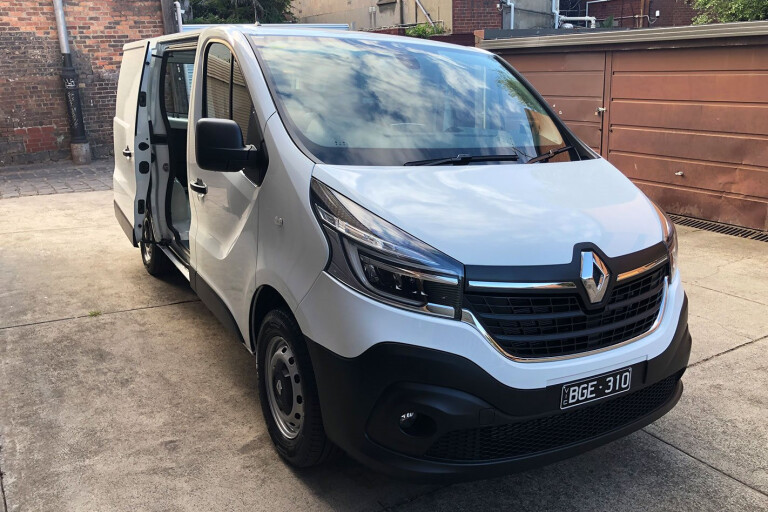
WHAT IS IT?
Vans have exploded in popularity over the last year to keep up with online shopping and tax breaks in a heavily re-shaped post-COVID economy.
If you're looking for something in the medium van segment, Renault’s ever-popular Trafic has been a mainstay in Australia since 2004, currently in its third generation since 2014.
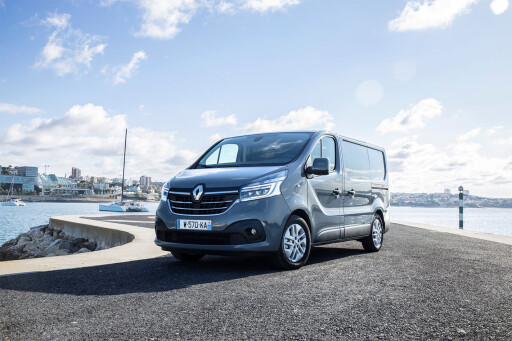 Renault updated the Trafic as recently as late 2019, smartening its looks with new LED headlights, adding a new powertrain and re-arranging spec levels.
Renault updated the Trafic as recently as late 2019, smartening its looks with new LED headlights, adding a new powertrain and re-arranging spec levels.
It also took the opportunity to reorganise the range and hinge it off three variants.
We’re testing the Premium version, the middle child between the entry-level Pro and range-topping six-seater Crew Lifestyle.
It's also the sweet spot with its healthy equipment levels and automatic option, starting at $40,490 for the short-wheelbase manual.
VALUE & FEATURES
The Premium costs $4K more than the entry-level Pro but packs a lot of kit for the ask, including a new powertrain.
While the Pro sticks with a trusty single-turbo diesel four-cylinder engine producing 85kW and 300Nm, the Premium upgrades to a twin-turbo 103kW/340Nm version.
Now you can spend another $4K and score 125kW/380Nm with a six-speed dual-clutch automatic transmission that Renault pinches from its very own Megane R.S hot hatch.
As for other configurations, a long-wheelbase chassis costs an extra $2000. But we’ve stuck with a short wheelbase Premium auto that costs $44,490 before on-roads.
It's overall $8K more expensive than the cheapest Trafic, bringing a slew of extra features outside and inside the cabin.
For instance, there are rear barn doors and an extra roller side door. These pair with a bulkhead behind the driver’s seat.
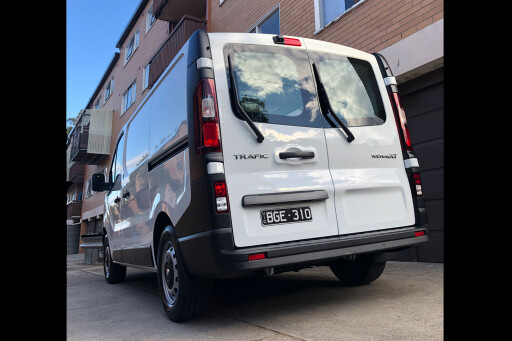 Inside, there’s auto start-stop, smartphone mirroring on the 7.0-inch infotainment system, a phone cradle and a workstation bench on the backside of the middle passenger seat.
Inside, there’s auto start-stop, smartphone mirroring on the 7.0-inch infotainment system, a phone cradle and a workstation bench on the backside of the middle passenger seat.
Last but not least is a load-through flap in the cargo space that hides long items in a compartment that extends underneath the passenger seat.
SIZE
A short wheelbase Trafic measures 4999mm long, 1956mm wide and 1971mm high. The wheelbase is set 3098mm.
Cargo length stands at 2.5-metres and the load-through flap allows up to 4.15m long items to slide through.
While this is handy for packing long items, it also opens an air passage between the cargo space and cabin, which is something to consider with harmful vapours on board.
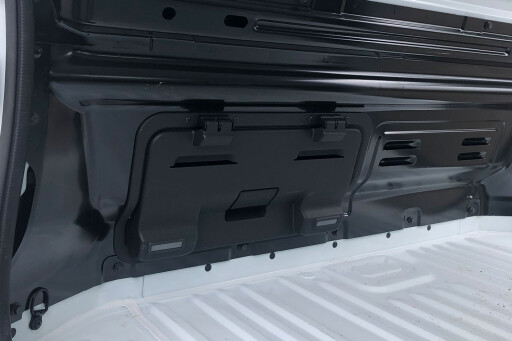 Pairing its cargo length with a height of 1.38m back there, Renault claims the Trafic SWB can swallow 5.2 cubic metres.
Pairing its cargo length with a height of 1.38m back there, Renault claims the Trafic SWB can swallow 5.2 cubic metres.
If you're sliding in bulky items on the floor, the wheel arches measure 1268mm across, otherwise comparable with the Peugeot Expert, Volkswagen Transporter and Mercedes-Benz Vito. The width above the wheel arches expands to 1662mm.
The barn doors work well, locking in the open position and measuring 1392mm across the opening.
The absence of a rear differential equals a low step-in height and there are plenty of tie-down points inside to secure cargo.
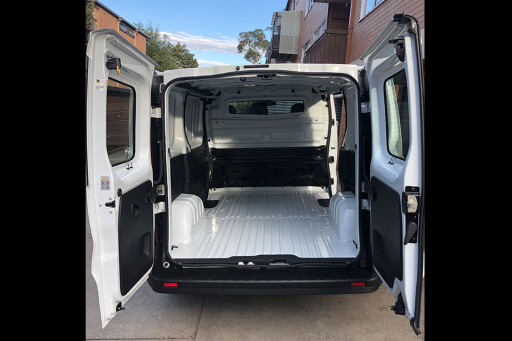 No tub-lining means the painted floor can be slippery under wet shoes and make hopping in without grab handles sometimes perilous.
No tub-lining means the painted floor can be slippery under wet shoes and make hopping in without grab handles sometimes perilous.
SAFETY & COMFORT
Up front, the Trafic’s well-finished cabin is an excellent place to sit, honouring the brand with a low-nonsense, squircle-centric interior that feels premium for a van.
The cloth driver’s seat is comfortable for a long day in the cabin, with good back support and cushioning.
There’s plenty of storage inside as well – Renault claims 90 litres – but the cupholders on the dash are woefully small and should suit small coffee cups only.
Of course, the inside of a van is the closest thing some drivers will have to office, so the Trafic addresses this with a scribble pad on the back of the middle passenger seat.
And if you’re averse to Apple Carplay and Andriod Auto, then the high-mounted phone cradle puts mobiles in easy view.
Speaking of, it’s relatively easy to see out of the cabin. But given the Trafic lacks crucial safety tech like active cruise and blind-spot monitoring, it’s baffling that the centre headrest can’t be removed to clear your rearward view.
ON THE ROAD
In a way, it’s a shame Renault’s Trafic is no longer manual only.

The six-speed manual is so easy to use that some may ask if the model ever needed an automatic. But Renault knew it was missing out on a chunk of sales.
We had reservations about using the Megane RS’s six-speed dual-clutch for a commercial purpose, however, it handles the job well.
With 200kg worth of cargo onboard, take-off is smooth, and while it’s not as responsive as a torque converter on part-throttle in traffic, it’s certainly bearable in stop-start situations and manoeuvring at low-speed.
It’s also paired with a real workhorse in the new Euro 6 compliant twin-turbo four-cylinder engine.
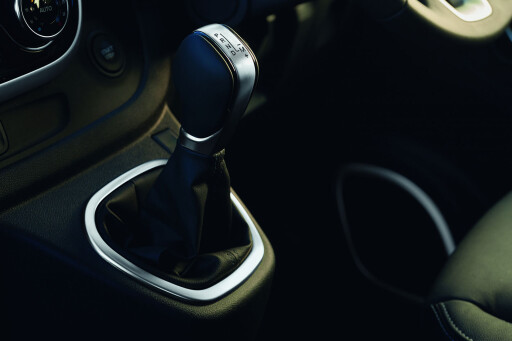 Offering 380Nm from 1500rpm, the Trafic has enough grunt to wheelspin from traffic lights if you are indelicate and can easily haul a load up to 100km/h, only running out of puff in top gear on inclines.
Offering 380Nm from 1500rpm, the Trafic has enough grunt to wheelspin from traffic lights if you are indelicate and can easily haul a load up to 100km/h, only running out of puff in top gear on inclines.
It’s matched to 1715kg braked tow and 1250kg payload ratings, although it’s worth mentioning the manual can handle a higher 2000kg braked tow rating.
As for fuel, Renault says it’s slightly thirstier than the middle-spec 103kW/340Nm engine, with 7.3L/100km playing 6.6L, and our 8.21L/100km tested consumption came close to matching the claim.
But the Trafic’s biggest drawcard remains how it drives.
From its natural steering to its superb ride quality, it’s easy to forget you’re piloting a van. If you’re spending lots of time navigating city streets we’d weigh this score heavily.
VERDICT
From an ownership perspective, Renault‘s five-year, 200,000km warranty on all Trafic models lags slightly behind rivals like Ford who offer unlimited kilometres.
But from its stylish looks to its comfy cabin and superb dynamics, the new 125kW dual-clutch powertrain puts another feather in the Trafic’s attractive cap, making it well worth a look.
Pluses: Looks, grunt, decent gearbox, ride, steering, nice interior
Minuses: Lack of cargo liner/handles, no active safety tech, cup holder size
3.5/5
*This article has been corrected concerning Renault's five-year warranty, which was originally published as three years.

COMMENTS